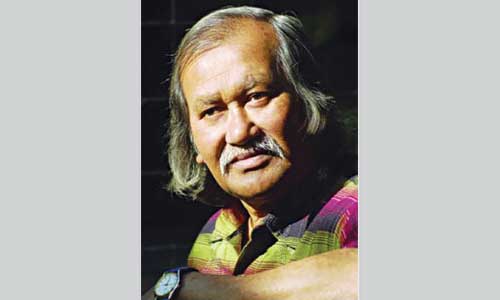Poet Rafiq Azad dies
Renowned poet and freedom fighter Rafiq Azad died on Saturday at a Dhaka city hospital, bringing the curtain down on a nearly four-decade illustrious career.
Rafiq Azad was awarded with Ekushey Padak in 2013 and Bangla Academy Award in 1984 for his outstanding contribution to Bangla poetry.
Rafiq Azad, one of the prolific poets, who enriched the Bangla literature through intense verses that dealt with political, social and personal issues, died aged 75 and is survived by two sons and wife.
Rafiq Azad’s son Abhoy Azad said that his father died at 2:10am at Bangabandhu Sheikh Mujib Medical University, who had been on life-support system, breathed his last at the intensive care unit.
The poet was admitted to the hospital on January 15 following a stroke.
His body will be kept at BIRDEM mortuary.
Rafiq’s body will be kept at Central Shaheed Minar at 10 am tomorrow and Bangla Academy for people to paying homage to the poet. His namaz-e-janaza will be held at Dhaka University Central Mosque after Zohr prayer on the day.
Abhoy Azad said that Rafiq would be buried at Mirpur Intellectual Graveyard on Monday.
As the news of the poet’s death spread, friends and well-wishers as well as followers crowded the hospital and poet’s house.
President Abdul Hamid and prime minister Sheikh Hasina expressed deep shock at the death of the poet and termed his death an irreparable loss to the literature of the country.
Jatiya Sangsad speaker Shirin Sharmin Chaudhury, Bangladesh Nationalist Party chairperson Khaleda Zia and cultural affairs minister Asaduzzaman Noor also expressed shock at the poet’s death.
Bangla Academy, publishers’ guild Academic and Creative Publishers Association of Bangladesh and others also expressed their shock at his death.
Tributes to the late poet poured in on social networking sites like facebook, twitter and others.
Rafiq was born on February 14, 1941 in Tangail.
A Bangla department graduate of Dhaka University, he worked as a teacher, civil servant and journalist besides writing at least 45 books.
As a freedom fighter, he fought as a member of ‘Kaderia Bahini’. As a poet, he depicted love, romance, poverty, sufferings, injustice, urban and rural life through his poems.
Rafiq Azad’s first book Asombhaber Paye was published in 1973. Some of his renowned works are Shimabaddha Jale Shimita Shabuje, Chunia Amar Archedia, Haturir Niche Jiban, Parikirna Panshala Amar Swadesh, Shahstra Sundar, Khub Bashi Durey Nay, Khama Karo Bahaman He Udar Amia Batas, Karo Asrupat, Prem O Biraher Kabita, Pagla Garad Thekay Premikar Chiti, Apar Aranya, Moulabir Man Bhalo Nai.
The 1974 famine leads to one of Rafiq Azad’s most famous poems ‘Bhat Dey Haramjada’. In the middle of June 1987 Azad had an arrest warrant issued against him as acting editor of the weekly Robbar, a supplement of daily Ittefaq for a publication that criticized dictator HM Ershad’s rule.
Rafiq was also director of National Book Centre, Upajatia Cultural Academy located at Birisiri in Netrakona and also worked with Bangla Academy. Rafiq also worked as deputy managing director of Bangladesh Jute Mills Corporations.
News Courtesy: www.newagebd.net











